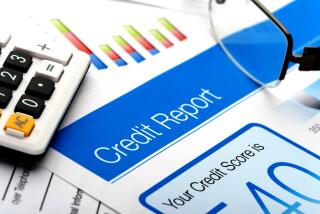Parent who co-signed student loans is saddled with debt
Dear Liz: I co-signed some private student loans for my youngest child. She graduated two years ago with about $80,000 in student debt, including federal and private loans. Like many other recent graduates, she has had a difficult time finding a job. She worked part time at a retail store until about a month ago and made around $7,000 annually. I have been helping her make reduced payments and she has gotten deferments and income-based repayment plans.
But I’m planning to retire in a few months and won’t be able to make the payments as I have been. I am heartsick about this whole situation, not just for my family, but also for thousands of young people who face this mountain of un-dischargeable debt. We desperately need some advice on how to deal with huge debt.
Answer: As you know, these loans typically can’t be shed in Bankruptcy Court and there is no statute of limitations on how long collectors can pursue this debt. Even your Social Security benefits aren’t safe: In 2005, the U.S. Supreme Court upheld the government’s ability to offset Social Security disability and retirement benefits when a borrower has defaulted on student loans.
Income-based repayment plans can provide some relief with the federal loans. This repayment option limits the required payment to 15% of your daughter’s discretionary income, and her balance can be forgiven after 25 years, according to Mark Kantrowitz, publisher of the FinAid.org financial aid site. If your daughter has no income, her required payment would fall to zero. Unlike deferment and forbearance plans, which have three-year limits, the income-based repayment allows zero payments indefinitely. She should investigate signing up for such plans for all her federal loans.
The private loans you cosigned have far fewer repayment options. Some have forbearance and deferment options, while others do not. You may be able to negotiate a lower payment temporarily, or you may not. Because private student loans’ rates and terms aren’t regulated the same way federal loans’ are, they’re considered much riskier. Using them is kind of like paying for college with credit cards, except unlike with credit cards, the debt can’t be discharged.
It’s too late to tell you that you shouldn’t have co-signed loans so close to retirement or any time you would be unable to take over the payments. If you have sufficient equity in your home, you may want to consider using it to pay off the private loans. A variable-rate home equity line of credit would allow you to pay only interest for 10 years, while a fixed-rate home equity loan would lock in today’s current low rates for the 20-year life of the loan. You will, of course, be putting your home at risk if you can’t make those payments.
Another possibility is to postpone your retirement until your daughter is gainfully employed. This may not be desirable or even possible, but at the moment you’re the only one with income to repay these loans.
Otherwise, your option is to try to negotiate an affordable repayment plan with the private lenders, which is no easy task. For more information, visit the Student Loan Borrower Assistance program at https://www.studentloanborrowerassistance.org.
High credit scores take longer to heal
Dear Liz: I am confused about your recent article about a person who did a short sale and questioned its effect on her credit. You said that if she started with a score of 680, it would take about three years for her FICO numbers to return to normal. You then said, “If your scores were high, say 780, it would take about seven years to restore them to their old peaks.” This doesn’t make sense to me. Why would it take longer to recover if you started with better credit?
Answer: Think of credit scores as a mountain that gets steeper the higher you climb. Not only does it take longer to achieve the lofty peaks, but if you tumble down the mountain, it will take you longer to return to those peaks than to achieve some intermediate stage.
The FICO formula is designed to reflect your likelihood of default. If you’ve recently missed a payment, had a bill go to collections or had a foreclosure or short sale, the formula assumes you’re much more likely to default on another bill than someone who doesn’t have those black marks on his or her record, and your scores fall to reflect that higher risk of default. As time passes and you handle credit responsibly, your scores will begin to slowly rise, but it will take more time to regain your peak scores if they were high.
Something else to understand is that the penalty for most negative credit events is greater for people with high scores than those with lower scores. Missing a single payment can knock up to 110 points off a 780 score but might deduct just 60 points from a 680 score. That’s because a higher risk of default is already “baked in” to the lower score. The higher score presumes you’re less likely to default. If you do miss a payment, the formula is set up to punish you more. In most cases, though, you won’t “fall down the mountain” as far as someone who started with a lower score. After the missed payment, the 780 score could be 670, while the 680 score could be 620.
Questions may be sent to 3940 Laurel Canyon, No. 238, Studio City, CA 91604 or by using the “Contact” form at asklizweston.com. Distributed by No More Red Inc.
More to Read
Inside the business of entertainment
The Wide Shot brings you news, analysis and insights on everything from streaming wars to production — and what it all means for the future.
You may occasionally receive promotional content from the Los Angeles Times.









